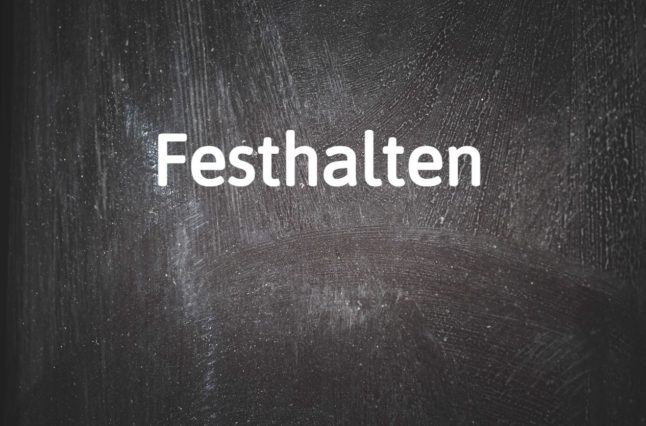“Festhalten.” Whether used to express that your sticking to your values or to acknowledge an important situation, this common German word has a slew of meanings. Google lists at least nine words as English translations.
Let’s break down exactly what’s going on, and how you are most likely to hear or read “Festhalten” in day-to-day life in German-speaking countries.
Hold on tightly
We’ll start with a simple definition: “Festhalten” can mean “to hold on.” This meaning can be applied to grabbing or holding for any reason: to avoid a fall, to cling for support, to clip documents together, or to stop the other from moving.
Example:
“Auf der Achterbahn musst du dich festhalten.”
“You must hold on tight to the roller coaster.”
Capture or detain
Another definition of “Festhalten” is to capture or detain someone and keep them from leaving an area. This term can also apply specifically to police.
Example:
“Mann hat Sie in der nächsten Statt festgehalten.”
“They apprehended her in the next city.”
Document or record
The following definition can mean to document or record something through any means. This can include video, audio or the written word.
Example:
“Es war alles in einem Tagebuch festgehalten.”
“It was all recorded in a diary.”
Acknowledge or confirm
Another definition of Festhalten is to “confirm” or “acknowledge” something important.
Example:
On an 80th birthday party someone might toast:
“Ich möchte festhalten, dass wir alle noch hier sind und es uns gut geht.”
“I want to acknowledge that we are all still here and doing well.”
“Wir halten fest, 21:10 wurde eingebrochen.”
“We confirm, at 9:10 pm there was a burglary.”
Expressing loyalty
Finally, “Festhalten” can also refer to a fierce loyalty to something. Someone who is adverse to change, resolutely standing by a tradition or way of life, is “holding on tight.”



 Please whitelist us to continue reading.
Please whitelist us to continue reading.
Member comments